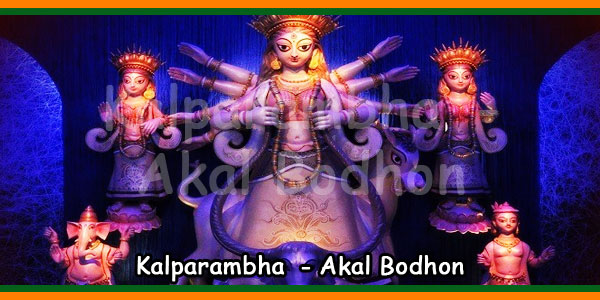Tuesday 26th September 2017
Kalparambha Puja Time:
Kolabou Puja on 27th, September
Monday 15th October 2018
Kalparambha Puja Time
Kolabou Puja on 16th, October
Friday 4th October 2019
Kalparambha Puja Time
Kolabou Puja on 5th, October
Wednesday 21st October 2020
Kalparambha Puja Time
Kolabou Puja on 22nd, October

Monday 11th October 2021
Kalparambha Puja Time
Kolabou Puja on 12th, October
Saturday 1st October 2022
Kalparambha Puja Time
Kolabou Puja on 2nd, October
Friday 20th October 2023
Kalparambha Puja Time
Kolabou Puja on 21st, October
Wednesday 9th October 2024
Kalparambha Puja Time
Kolabou Puja on 10th, October
Sunday 28th September 2025
Kalparambha Puja Time
Kolabou Puja on 29th, September
Friday 16th October 2026
Kalparambha Puja Time
Kolabou Puja on 17th, October
Tuesday 5th October 2027
Kalparambha Puja Time
Kolabou Puja on 6th, October
Saturday 23rd September 2028
Kalparambha Puja Time
Kolabou Puja on 24th, September
Friday 12th October 2029
Kalparambha Puja Time
Kolabou Puja on 13th, October
Wednesday 2nd October 2030
Kalparambha Puja Time
Kolabou Puja on 3rd, October
About Kalparambha and Akal Bodhon:
In West Bengal, Kalparambha signifies the beginning of Durga Puja rituals. It is performed one day before Kolabou Puja, which is known as Navpatrika Puja. Kalparambha generally occurs on the Shashthi Tithi of the lunar month.
Kalparambha rituals are equivalent to Bilva Nimantran in other states. On this day, Goddess Durga is invited to stay in Bilva tree or in a Kalash. This invitation of Goddess Durga is known as Amantran and installing Her spirit into Bilva tree is known as Adhivas. Sanyakal is considered to be the best time to invoke Goddess Durga. It is approximately 2 hours and 24 minutes before sunset.
The day of Kalparambha is also known as Akal Bodhon. Akali Bodhan means untimely invocation of Goddess Durga. As per Hindu tradition, Goddess Durga is worshipped in Chaitra month of Hindu calendar. This tradition is still followed, as Goddess Durga is worshipped for nine days during Chaitra month, which is known as Chaitra Navratri. However, Chaitra Navratri has now become less significant compared to Sharad Navratri.
As per scriptures, it was Lord Rama who performed Akal Bhodon for the very first time, when he awakened Goddess Durga before his battle against demon Ravana, seeking the blessing of Goddess Durga to win the battle and rescue His wife Sita. This untimely invocation of Goddess Durga initiated the tradition of Sharad Navratri and Durga Puja.
Kalparambha during Durga Puja is symbolically equivalent to Ghatasthapana or Kalashsthapana, which is performed on the Pratipada Tithi of Navratri. In West Bengal, Durga Puja is mainly celebrated for three days, which is considered a smaller version of the 9-days celebrated in other states. According to the religious texts, Navaratri celebrated in 9 days can also be limited to 7 days, 5 days, 3 days, 2 days or even 1 day.
Significance and Legend:
According to a Hindu legend, a Buffalo Demon Mahishasura, after years of praying to Lord Brahma, was granted a boon which made him invincible. Any man or God could not kill him. After gaining power, Mahishasura started destroying the world. He began to kill people and became a threat for Gods. To annihilate Mahishasura, Goddess Durga emerged from the collective energies of Gods as a divine feminine power. The victory of Good over the Evil is celebrated during Durga Puja.
Another popular legend says that Goddess Durga visits her mother’s place during Sharda Navratri.
